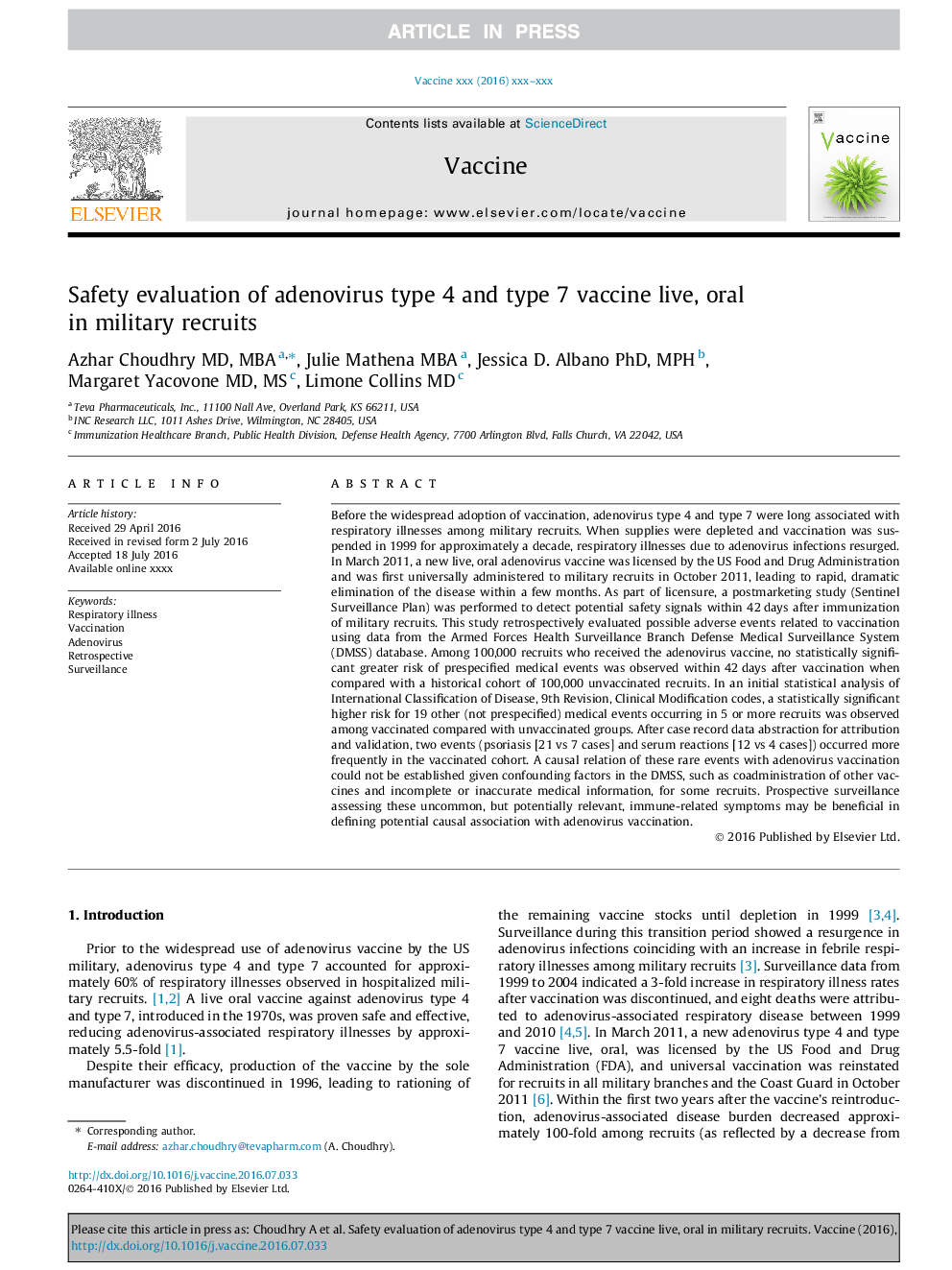| کد مقاله | کد نشریه | سال انتشار | مقاله انگلیسی | نسخه تمام متن |
|---|---|---|---|---|
| 10962376 | 1102632 | 2016 | 7 صفحه PDF | دانلود رایگان |
عنوان انگلیسی مقاله ISI
Safety evaluation of adenovirus type 4 and type 7 vaccine live, oral in military recruits
ترجمه فارسی عنوان
ارزیابی ایمنی واکسن آدنویروس نوع 4 و نوع 7 زنده و دهان در استخدام نظامی است
دانلود مقاله + سفارش ترجمه
دانلود مقاله ISI انگلیسی
رایگان برای ایرانیان
کلمات کلیدی
موضوعات مرتبط
علوم زیستی و بیوفناوری
ایمنی شناسی و میکروب شناسی
ایمونولوژی
چکیده انگلیسی
Before the widespread adoption of vaccination, adenovirus type 4 and type 7 were long associated with respiratory illnesses among military recruits. When supplies were depleted and vaccination was suspended in 1999 for approximately a decade, respiratory illnesses due to adenovirus infections resurged. In March 2011, a new live, oral adenovirus vaccine was licensed by the US Food and Drug Administration and was first universally administered to military recruits in October 2011, leading to rapid, dramatic elimination of the disease within a few months. As part of licensure, a postmarketing study (Sentinel Surveillance Plan) was performed to detect potential safety signals within 42Â days after immunization of military recruits. This study retrospectively evaluated possible adverse events related to vaccination using data from the Armed Forces Health Surveillance Branch Defense Medical Surveillance System (DMSS) database. Among 100,000 recruits who received the adenovirus vaccine, no statistically significant greater risk of prespecified medical events was observed within 42Â days after vaccination when compared with a historical cohort of 100,000 unvaccinated recruits. In an initial statistical analysis of International Classification of Disease, 9th Revision, Clinical Modification codes, a statistically significant higher risk for 19 other (not prespecified) medical events occurring in 5 or more recruits was observed among vaccinated compared with unvaccinated groups. After case record data abstraction for attribution and validation, two events (psoriasis [21 vs 7 cases] and serum reactions [12 vs 4 cases]) occurred more frequently in the vaccinated cohort. A causal relation of these rare events with adenovirus vaccination could not be established given confounding factors in the DMSS, such as coadministration of other vaccines and incomplete or inaccurate medical information, for some recruits. Prospective surveillance assessing these uncommon, but potentially relevant, immune-related symptoms may be beneficial in defining potential causal association with adenovirus vaccination.
ناشر
Database: Elsevier - ScienceDirect (ساینس دایرکت)
Journal: Vaccine - Volume 34, Issue 38, 31 August 2016, Pages 4558-4564
Journal: Vaccine - Volume 34, Issue 38, 31 August 2016, Pages 4558-4564
نویسندگان
Azhar MD, MBA, Julie MBA, Jessica D. PhD, MPH, Margaret MD, MS, Limone MD,
